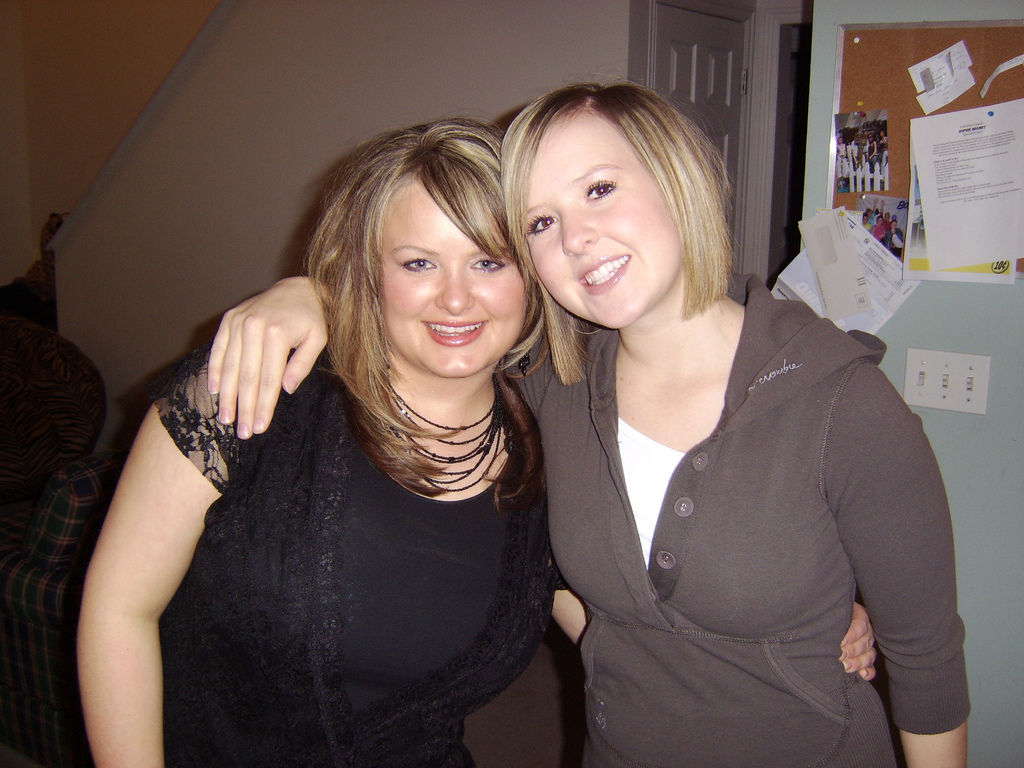Where were we? Oh yes, somewhere around here.

In high school I did all the diets. Funny, right? That I would worry about something like dieting when I was the most active, the thinnest that I will likely ever be. But I came from a dieting household. I did Atkins with my mom, looked into Weight Watchers, went on a “sugar fast” with my 14 year old sister and my mom the during my first semester of college. But I grew tired of dieting so I gave up. I gave up so completely that I gained around 50 lbs in 2 years.
Then I was given this book.
I remember staying up most of the night reading it. I remember nodding my head and saying “Yes! Yes!” out loud (good thing I didn’t have someone living in the same room with me at the time, she would have thought I was crazy). I remember going to the store the very next day and buying my own copy because I wanted my own; I just knew that this was a book I would want to keep.
I had actually been prepped for this book in the Beginning Nutrition class I took a few years previous. In the section on childhood nutrition we read an excerpt from a book that little children’s bodies don’t crave milkshakes and french fries. They ask for them and eat them because they know they taste good, and because they know they will feel comforted for the moment. But a little child’s mind can’t seem to grasp the idea that they will eat this sugary thing now, and feel sick because of it afterwards. Never before had I thought about nutrition in this way.
You will find many reviews online about how this book “encourages victimhood” and is full of psychobabble about loving yourself, but that is exactly what I needed. I had only heard one other train of thought “You can only like yourself if you change yourself”, but whatever I did, the change wasn’t happening. I was told by Atkins “Only eat meat”, I was told by Weight Watchers “Eat within the points”, and I was telling myself “Just ignore everything everyone else is saying, but don’t think to hard about what you actually feel.”
It’s been approximately 3 years since I read the book, but in many ways that is probably a good thing. Instead of spouting off ideas and principles from a quick read of the book, I can tell you the things I retained over time. These are the things that matter most.
The book is broken up into three sections.
Section 1: Reclaiming your body
Section 2: Reclaiming your appetite
Section 3: Reclaiming yourself
and there are three principles which I still live by to this day.
Principle one:
Stop with the “bad body thoughts”. Stop looking in the mirror and saying how much you hate the way you look. Stop worrying about how everyone else looks. Stop looking at your best friend and thinking “If I had her calves, I would feel better.” Think about when you started voicing these bad body thoughts and resolve to stop.
This is actually the principle I struggle with least, all thanks to a friend I had growing up who constantly complained about how fat she thought she was. This was when we were 13 years old! After being around that for a few years, I told myself I wouldn’t ever do that to anyone around me, and to my knowledge I haven’t. You know that scene in Mean Girls, where Cady goes to Regina’s house for the first time, and all three of the Plastics go stand in front of the mirror and point out the things they hate most about themselves?
I don’t do it now, and I’m not sure I ever have. If you stop, I guarantee it will make it easier for your friends to spend time with you. Isn’t it annoying when you are with someone and you constantly have to be saying “Oh no honey, your lips/hair/skin/things/butt/back/breasts/stomach/love handles/ankles/knees/neck/ears/nose/cheeks/cheekbones/fingernails/big toe, look fantastic!”
What I had to work on, was looking into my past a little bit. Pinpointing the experiences that made me feel so negatively about myself (because I realized that I didn’t feel wonderful about myself when I was skinny either, or else why would I have been dieting as a teenager, so the problem wasn’t completely rooted in the fact that I was fat. Therefore, a diet wasn’t the solution. Because if I lost the weight, those issues would likely still be there.)
Stop dieting. Diets don’t work. The majority of overweight people say “I’ve tried all the diets.” If diets worked then all the fat people would be thin. If their was a diet that worked, we would all know about it RIGHT? Because it would work for everyone and the person who wrote the book on it would have billions of dollars because all the people would read it.
Principle two:
This is where most of you will turn away from the book. You will stop reading because swimsuit season is coming up, or your brother’s wedding, or because you can’t bear to gain a single pound.
Stop putting restrictions on food. Legalize everything. Stop labeling things as “good” or “bad”. The book takes things so far as to encourage eating whatever you want all the time. Seriously, just eat cakes and cookies and lemon bars all day long. In fact, they encourage you to bring those treats in your purse with you, so whenever you want it, you can have it without delay.
The idea behind this principle is to take things off of the “forbidden” list. Don’t you sometimes find yourself eating a whole box of Oreos because you eat two and feel guilty and say “Well, I guess I might as well keep going.” But what if you didn’t feel guilty for eating those two? Would you keep eating?
You can bet that I really enjoyed doing this. It was so freeing to just eat all the junk I ever wanted without stressing about it! My mom did not like this stage, and it why she won’t read the book to this day. Eventually, I realized that I didn’t want the junk. I wanted to feel healthy and feel fit (tomorrow post will explain how I finally did that).
The other idea, and you won’t like this one either, is to go through your closet and throw out your “When I lose weight” clothes. I know you have them, we all do. Throw them out and say “I’ll work to accept who I am today.” We sometimes tell ourselves that we are hanging on to those things as a positive incentive to change, but doesn’t our frustration in our inability to fit into them often exacerbate the problem?
Principle three:
Here is where the information I learned in my nutrition class clicked together with the book. The last section is devoted to this concept of “mouth hunger”.In short, mouth hunger is different from the physical hunger signals our body sends to tell us it needs more fuel. Mouth hunger is about psychology.
Mouth hunger! What wonderful thing to learn. When I want an Oreo, it’s not because my body says “I want the nourishment of that creamy filling.” No, my body knows for past experience that eating too many Oreos can make me feel sick and gross. It’s my taste buds, my mouth, the pleasure receptors in my brain that want the Oreo.
And so now that I have legalized all food, I’m allowed to think about food. Before, food was in “good” and “bad” boxes. I wasn’t allowed to even think about eating the Oreo because it was a terrible thing and obviously I should not have it. But now, Oreos were on the green list, all food is on the green list. I realized if I can have anything in the world right now, why would I want to have an Oreo, are they really that good?
I hold the Oreo in my hand and I say “Why do I want to eat this cookie?” Do I want something sweet? Something crunchy? Something salty? Will one Oreo be enough? If not, how many do I want? Is what I am experiencing right now an example of “mouth hunger”. Then, if I want to eat the Oreo, I eat it. And I can because there are no good or bad foods. And I don’t feel guilty. So when I reach for the second cookie it’s because I actually want it, not because I say to myself “Oh, I’m not eating sugar for the rest of my life tomorrow, so I’ll just go ahead and indulge today.”
In fact, since I’ve read that book, I’ve never had any kind of a “Last Supper” ever again. You know the Last Supper? The day where you say you are going on the diet tomorrow so you better eat whatever you want today to fill the void that will be created. And how many times have you done that throughout your life (I did it lots of times before the book). If you are never going on a diet ever again, there is no need for a Last Supper. Just forget about that principles completely because it is a stupid thing to do.
At this point you are very confused. How could I have lost weight by eating whatever I want? If I ate whatever I wanted, I would get fatter. You are right, I didn’t lose weight because of some magical plan this book laid out. For the first few months, I think I gained weight because of this book, because I was eating what I wanted. But if you are reading this post because you are hoping to lose weight, haven’t you been dieting and still feeling like you are gaining/or staying the same? At least after reading this book I felt happy again, and I wasn’t on one of those miserable diets.
The picture at the top of this post was taken in the beginning of 2006. The picture below was taken in April of that year.

22nd birthday. I had to cut slits in the front and back of those boots to get them on. One month later I stepped on a scale for the first time in many months and saw I was the number 198 staring back at me. I was shocked to realize how close I was to tipping the 200 lb mark!

In Cabo with my favorite ladies, July 2006. I was trying to exercise more, focusing on what I was eating, but I hadn’t yet developed the system that would leave me 50 lbs lighter.

It was on October 20th 2006 that I finally made the change that would lead me to lose the weight for good. I was down 8 lbs since May. Hooray!

So what changed? How did I go from the photo above with my Andersen sisters, to the photo below (again with the Andersen sisters), in 2 years?

Well, you will have to wait one more day for that.













February 2nd, 2009 on 8:23 pm
I am so looking forward to hearing the rest of your story. I’m “struggling” right now with the fact that I am somewhat happy where I am, but I know it’s not healthy. I want to be in a healthy BMI range which is about 13 pounds from where I am now. But, and I hope you don’t take offense to this, I don’t “look” overweight. I have a very small upper body and all my weight is in my lowerhalf and I know how to dress appropriately. The few people who I tell my actual weight to are shocked (or at least they pretend to be!) so I think to myself “well I’m hiding it well” … I just need to take that next step to get to a healthy weight! Anyway, that’s my story up until now, I can’t wait to hear the rest of yours. Thanks for sharing.
(I’m delurking, but I’m a big Weddingbee fan of yours!)
Reply
Shaylene (That Wife's sister) Reply:
February 3rd, 2009 at 1:09 am
I am studying Nutrition (to become a dietitian) and have learned about BMI’s. That is just a tentative guideline. I have never been in the “healthy” range. I have always been a bit over, but that is because I just have a lot of muscle and so I weigh more. So don’t worry too much about BMI. Just eat good food that makes you feel happy and healthy and exercise as often as possible!
Reply
February 2nd, 2009 on 8:47 pm
Ahh!! Don’t do this to us!
I have always felt that diets weren’t the answer. Eliminating food for good (especially whole food groups like some extreme diets) just won’t work in the long term and it’s incredibly depressing to boot.
My newest epiphany has come that I’m trying to work into my subconscious: eat real food. It’s so much better to have a little of something made from fresh, real ingrediants than a lot of stuff that is meant to be “reduced calorie” and that reduction comes from artificial ingrediants and chemicals. I’m trying hard to reduce the amount of over-processed, artifically addivtive food that I eat and replace with something a chef would make - not what a food scientist would cook up.
There is so much little truths out there in every healthy eating/diet plan - we just have to take what is truth, what is realisitic, and put it to use. The Word of Wisdom is always a great eating plan to follow too!
Reply
February 2nd, 2009 on 8:51 pm
Augh! Suspense! Can’t wait for the rest of the deets.
Reply
February 2nd, 2009 on 9:52 pm
Oh, wow! I’m loving this story. I particularly like the concept of focusing on what you really want, rather than feeling guilty and eating it anyways (that isn’t nearly as clear as you laid it out for us). I like the idea of green-lighting all foods, I can’t wait for part 3
Reply
February 2nd, 2009 on 10:19 pm
Truly inspiring. What a great story- I can’t wait for the next “chapter”!
Reply
February 2nd, 2009 on 10:24 pm
First, I want to applaud that you are sharing this with the world. You are a very brave and mature woman to be able to do it.
I also want to thank you for suggesting the book that helped you so much. I did Weight Watchers and found that it helped me think different about food; my main problem has always been portion size. At 4’10″ I have no business eating the same amount as taller people. But now I think differently about what I eat, kind of like what you said … if I can pick anything I want, and I’m hungry, well … veggies and chicken with rice is a lot more filling than a thing of McDonald’s fries, but it counts the same as far as calories. Food becomes less about taste and more about powering your day.
I also really loved the book “Body Clutter: love your body, love yourself” by Marla Cilley and Leanne Ely, of the Flylady.net fame. If people are looking for books, that’s another great one
Reply
February 3rd, 2009 on 12:44 am
Your honesty is really moving. You’re doing a great job of telling your story. Bravo, girl - on so many levels.
Reply
February 3rd, 2009 on 1:05 am
I totally want to read that book! I am working on Intuitive Eating right now, but I am taking Anatomy so you understand how that takes up all my time!
Reply
February 3rd, 2009 on 2:29 am
Fascinating. I have some questions…
Did your mum know that you were dieting all those years from such a young age? How did she feel about it? Have you thought about how you’ll educate/ set examples for your own children about food? How would you feel/ what would you do if your 14-year-old daughter told you she were going on a diet?
Reply
February 3rd, 2009 on 8:08 am
Such an important aspect of weight loss that gets overlooked! When I fall off the wagon/fit train, I am pretty sure it is because I have not totally and 100% conquered the need to compare myself to other women..
Reply
February 3rd, 2009 on 8:51 am
I’m so glad to read your story on this. I had the same issue in college - I was just eating and eating and eating and then all of the sudden I realized I was almost 200 pounds! For someone who knows they have always been overweight, 200 suddenly becomes the number where you think “Oh my goodness, what am I doing!?”. The truth is that your body likes to exercise and eat healthy foods, the trick is staying with it long enough to convince your brain that you like it too!
Reply
Jenna Reply:
February 3rd, 2009 at 4:04 pm
I found this to be SOOO true. When I am focusing on my nutrition, I find that over time I don’t even have to stop and say “do you want to eat the cookie” because I don’t want to. It makes me believe really strongly in the idea of nature v. nurture in nutrition. Our bodies aren’t born with the desire for junk food, it is a learned thing.
Reply
February 3rd, 2009 on 9:00 am
Jenna, First I just want to say congrats on how much progress you have made and for being able to be so honest with yourself (and with the internet!). I will definitely be picking up this book from my library this week. For a lot of women food becomes so much more than just nourishment for the body. I have always had a hard time stopping when I’m full so I think this book could help change my mindset toward food.
Reply
February 3rd, 2009 on 11:00 am
[...] I read the book, I went several months without actively trying to lose weight. I actually had to go back and read [...]
February 9th, 2009 on 12:47 pm
[...] posted on how I got fat, and the book I read, my crazy philosophies, and the things I did to be not fat anymore, and part of me naively thought [...]